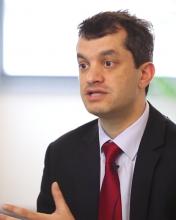RAMP: Epidemiological modelling of the COVID-19 pandemic
21 June 2022
EPCC and the University of Edinburgh’s School of Physics and Astronomy have been working on the Royal Society-convened Rapid Assistance in Modelling the Pandemic (RAMP) initiative.
“We founded RAMP to support overburdened epidemic modellers by providing volunteers, model development, literature review, and its current focus of scientific workshops. RAMP volunteers contributed over 15 person-years of effort direct to SPI-M modelling teams, and more than that to independent modelling efforts.”
Prof. Mike Cates,
Chair of the RAMP Steering Group
The work expanded beyond its original brief to set up a volunteer programme, to also spawn independent teams writing independent epidemic-modelling code. The RAMP volunteer programme has now closed and we are embarking on a project with Microsoft and collaborators in the UK and the USA to quantify uncertainty in epidemiological modelling.
On March 25th, 2020, Mike Cates, Lucasian Professor of Mathematics at the University of Cambridge, contacted EPCC on behalf of the Royal Society asking for support in setting up a volunteer programme. The Scientific Pandemic Influenza Modelling Group (SPI-M), the UK academic community of pandemic modellers, was at full stretch and was in need of volunteers with suitable skills in computer modelling. EPCC set up a survey to collect volunteer information and the infrastructure to process the collect data, and by March 27th the Rapid Assistance in Modelling the Pandemic (RAMP) programme was in full flight.
And what a flight that was. When we closed the survey on April 3rd we had received 1,854 responses; as people kept approaching us, we opened more surveys and received in total 2,028 responses from 44 countries. Many of the offers were from groups and the total number of volunteers was never calculated, but the response is humbling.
Led by our SPI-M contact, Prof. Julia Gog, we offered the first batch of volunteers to SPI-M groups on April 7th. By the end of the volunteer programme in August 2020 we had offered 93 responses to 28 SPI-M subgroups. We also created a small community around a forum (we acknowledge the voluntary contribution of thepavilion.io in customising the software for it), which delivered well received rapid review of publication pre-prints, amongst other community discussion of scientific outputs.
In addition to SPI-M, RAMP offered another 118 responses to 11 different organisations and teams. These were scientists with strong computational and mathematical backgrounds, most of whom had not worked on human, or indeed any kind of, epidemic modelling. In addition to fuelling new groups, like the Scottish COVID-19 Response Consortium, a rapid response group at the University of Edinburgh allayed concerns about the Imperial College London code that led to the change in UK and US strategies in addressing the pandemic in March, helping restore faith in science. In addition, Prof. Graeme Ackland of the School of Physics and Astronomy and former EPCC Director Prof. Sir David Wallace designed, wrote and implemented a new epidemic modelling code; the code has now been adopted by the Scottish Government, SPI-M, and the UK Health Security Agency.
The RAMP Steering Group also attracted UKRI funding towards the RAMP Continuity Network (January 2021 till July 2022), which delivers: RAMP-convened scientific discussion meetings, study groups, and workshops; the RAMP Rapid Review Group, which scrutinizes outputs and reports so as to better inform Government; and policy work to ensure the scientific outputs of RAMP and others land correctly within Government to maximise their policy value.
Volunteers' data
So where are all the personal data of the volunteers now? Quite simply, we deleted them. We kept some anonymous information to support simple statistics and some suggestions for the future but the original personal data have been deleted.
The legal teams of the University of Edinburgh and of the Royal Society generated simple Privacy Statement, Data Processor, and Data Controller documentation which governed our use of the volunteer data, and these documents may be useful in a future pandemic.
Open-source modelling tools
We now look towards the future. After the volunteer programme of RAMP concluded, we worked with UKRI funding (from June 2020–November 2021) under Prof. Ackland and Microsoft to adopt an open-source modelling tool called COVID-UI that GitHub had developed, and which was aimed at policymakers to run and compare the outputs of various models under user-specified conditions. Through this programme we ported the tool to Microsoft Azure, added WSS to it and made the open-source code more maintainable and sustainable. COVID-UI is now documented in good detail, to support future uptake.
This work was supported through Microsoft’s “Studies in Pandemic Preparedness” collaborative research programme. The work is continuing with a follow-up effort towards quantifying and explaining epidemiological model uncertainty, the University of Edinburgh working with the Universities of Exeter, Oxford, Johns Hopkins and Washington, the Wilson Centre, and supported by Microsoft.
The societal goal is to help improve policymaker and public confidence in mathematical models used during the COVID-19 and future pandemics. The research objective is to develop, demonstrate, and deploy state-of-the-art machine learning and data visualisation approaches to measure and better explain uncertainty in models for UK COVID-19 response, US local COVID-19 response, and vector-born epidemic response.
Our work to improve pandemic response is ramping up.
Further information
Microsoft’s “Studies in Pandemic Preparedness” collaborative research programme:
https://aka.ms/PandemicPreparedness
The Edinburgh RAMP team linked to UKRI ST/V00221X/1 and UKRI EP/V053507/1: Professor Mark Parsons, Mario Antonioletti, Clair Barrass, Steven Carlysle-Davies, Nick Johnson, Kostas Kavoussanakis (EPCC); Professor Graeme Ackland (School of Physics and Astronomy); Chris Ness (School of Engineering).
Image credit: Eoneren via Getty Images
Subscribe to our newsletter
To read more stories like this, subscribe to EPCC News (two issues per year). See link at foot of page.

